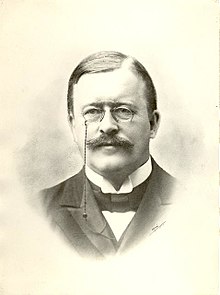Johan Castberg | |
|---|---|
 Castberg in 1900. | |
| Member of the Norwegian Parliament | |
| In office 1 January 1925 – 31 December 1927 | |
| In office 1 January 1913 – 31 December 1921 | |
| In office 1 January 1900 – 31 December 1909 | |
| Minister of Justice | |
| In office 19 March 1908 – 2 February 1910 | |
| Prime Minister | Gunnar Knudsen |
| Preceded by | Johan Bredal |
| Succeeded by | Herman Scheel |
| Minister of Social Affairs | |
| In office 1 July 1913 – 22 April 1914 | |
| Prime Minister | Gunnar Knudsen |
| Preceded by | Position established |
| Succeeded by | Kristian Friis Petersen |
| Minister of Trade | |
| In office 31 January 1913 – 1 July 1913 | |
| Prime Minister | Gunnar Knudsen |
| Preceded by | Ambortius Lindvig |
| Succeeded by | Kristian Friis Petersen (1916) |
| Personal details | |
| Born | 21 September 1862 Brevik, Telemark, United Kingdoms of Sweden and Norway |
| Died | 24 December 1926 (aged 64) Oslo, Norway |
| Political party | Liberal Radical People's |
| Spouse | Karen Cathrine Anker |
| Relations | Peter H. H. Castberg (grandfather) Johan C. T. Castberg (father) Katti Anker Møller (sister-in-law) |
| Children | Frede Castberg Torgrim Castberg |
| Occupation | Jurist |
Johan Castberg (21 September 1862 – 24 December 1926) was a Norwegian jurist and politician best known for representing the Radical People's Party (Labour Democrats). He was a government minister from 1908 to 1910 and 1913 to 1914, and also served seven terms in the Norwegian Parliament. The brother-in-law of Katti Anker Møller, the two were responsible for implementing the highly progressive Castberg laws, granting rights to children born out of wedlock. Altogether, he was one of the most influential politicians in the early 20th century Norway.[1]
In 2013, an oilfield in the Barents Sea was named after Johan Castberg.[2]
- ^ "Castberg, Johan". Aschehoug og Gyldendals Store norske leksikon. Kunnskapsforlaget. 2007.[permanent dead link]
- ^ "Offshore Energy Today" Statoil’s Skrugard and Havis Fields Renamed to Johan Castberg